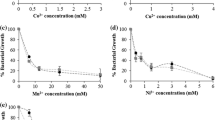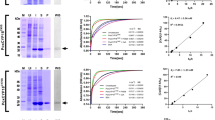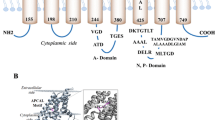Abstract
Ca2+ enhanced the plasma membrane Ca2+-ATPase (PMCA) specific activities in wild-type strain 1227 and mutant strains 1278, 1286, and 1261 of Thermoactinomyces vulgaris. The Ca2+-ATPase specific activities showed marked increase with increasing concentrations of Ca2+ added in the form of CaCl2 in the culture medium and reached the optimum values at 0.6 mM in strains 1227, 1278, and 1286 and at 0.7 mM in strain 1261 of T. vulgaris. Trifluoperazine, a specific blocker of calmodulin, when added in vivo at concentrations of 2 μM and 8 μM along with the respective optimal concentrations of Ca2+, decreased the PMCA-specific activities to a low level in a dose-dependent manner. The results of the present investigation suggest the presence of a Ca2+-dependent protein activator (CaDPA) in the microenvironment constituting this enzyme; and such Ca2+-modulated protein has been assigned to play an important role in the enhancement of PMCA levels in this aerobic, spore-forming, thermophilic actinomycete.
Similar content being viewed by others
Author information
Authors and Affiliations
Rights and permissions
About this article
Cite this article
Bhatnagar, ., Singh, . Ca2+ Dependence and Inhibitory Effects of Trifluoperazine on Plasma Membrane ATPase of Thermoactinomyces vulgaris . Curr Microbiol 49, 28–31 (2004). https://doi.org/10.1007/s00284-003-4261-8
Issue Date:
DOI: https://doi.org/10.1007/s00284-003-4261-8




